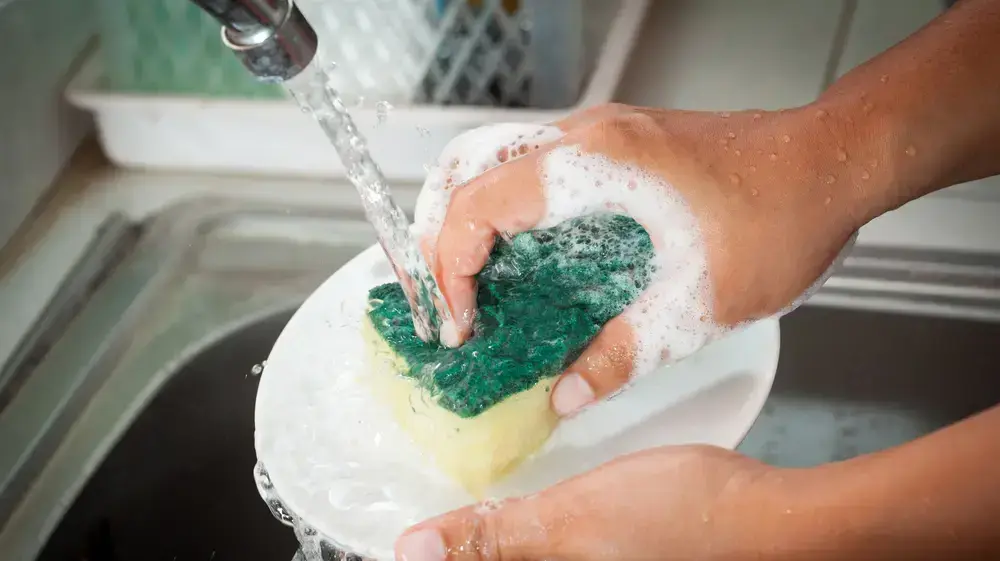Doha!
A study found that the kitchen sponge contains more bacteria than a petri dish in the lab
How often do you change your sponge?
Studies show that really not at the right frequency.
This is the stressful reason that will encourage you to rejuvenate with a new set of sponges
Not to be missed
01/03/2022
Tuesday, 01 March 2022, 23:50
Share on Facebook
Share on WhatsApp
Share on Twitter
Share on Email
Share on general
Comments
Comments
What are the most polluted items we use every day?
("Story in a Minute" system)
When was the last time you replaced your dish sponge?
A number of recent studies have found that they have more bacteria living there than on a petri dish in the lab, so we hope the answer to the question we asked you is at least once a month.
According to experts, you actually wash your dishes with the dirtiest item in the house.
Sponges, as well as cutting boards, are often referred to as "bacterial breeding grounds."
A study from Furtwangen University in Germany recently found that a kitchen sponge has over 362 different species of bacteria living in it.
This means that it contains more bacteria than anywhere else in your home - and fecal ultrasonic bacteria and salmonella are just two of the ones that grow there.
This is especially worrying because these two bacteria are linked to food poisoning - and no one wants to risk being found where they eat.
Another polluted place
Experts warn: Your reusable water bottle is full of mold - so wash it properly
To the full article
It just looks clean: no matter how much soap you put on it, it is infested with bacteria (Photo: ShutterStock)
Your cutting board is dangerous to health because you do not clean it properly
Why should the dishwasher be put in the dishwasher at least once a week?
Looking for a new sport to fall in love with and make a difference in life?
Although it is common to think that cleaning the sponge will do the job, it is not that simple.
The trick to cleaning the sponge - heating the sponge in the microwave will not really kill the bacteria.
On the contrary, some argue that this cleaning trick can only aggravate the situation, as the hot environment can lead to the proliferation of bacteria.
One of the easiest ways to prevent bacteria from accumulating in your dish sponge is to actually let it dry completely to prevent moisture that can cause organisms to multiply.
In any case, no matter how you try to clean it - whether it is in the microwave, in the dishwasher or soaking it in vinegar, no method is completely effective.
Instead, the best way to get rid of the bacteria is to simply change the sponge every week or two.
To keep the sponge longer, experts have suggested using a bath cloth to clean surfaces and counters as they do in restaurants.
This way you can wash the cloth and use it again and again.
Dirty sponge (Photo: Giphy)
Further research on the subject conducted by Duke University researchers found similar data.
The new findings show that it is not the accumulated dirt but the structure of the sponge that makes it a bacterial trap.
Similar to humans, some species of bacteria like to live with their bacterial mates, while others prefer to live alone.
Researchers have found that species of bacteria that prefer a "mixed housing environment" are more likely to live in the sponge of your kitchen due to its structure.
"As it turns out, a sponge is a very simple way to implement a multilayer division to improve the overall microbial community," Lingchong Yu, a professor of biomedical engineering at Duke, said in a university statement.
"Perhaps because of this, the structure of the sponge is a perfect habitat for bacteria."
The findings suggest that structural environments with large spaces between them can help bacteria thrive.
When they tested the kitchen-soaked structure, the team found that it allowed for more bacterial growth pad than any other lab equipment they tested.
you have been warned!
Home and design
news
Tags
Cleanliness
dishes
Soap
sponge

